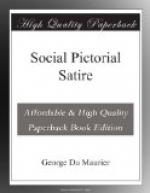It is a glorious, exhilarating scene, with the beautiful wintry landscape stretching away to the cloudy November sky, and the lords and ladies gay, and the hounds, and the frosty-faced, short-tempered old huntsman, the very perfection of his kind; and the poor cockney snobs on their hired screws, and the meek clod-hopping labourers looking on excited and bewildered, happy for a moment at beholding so much happiness in their betters.
[Illustration: ONE OF MR. BRIGG’S ADVENTURES IN THE HIGHLANDS
After aiming for a Quarter of and Hour Mr. B. fires both of his Barrels—and—misses!!!! Tableau—The Forester’s Anguish—Punch, 1861.]
To have seen these sketches of the hunting-field is to have been there in person. It is almost the only hunting that I ever had—and probably ever shall have—and I am almost content that it should be so! It is so much easier and simpler to draw for Punch than to drive across country! And then, as a set-off to all this successful achievement, this pride and pomp and circumstance of glorious sport, we have the immortal and ever-beloved figure of Mr. Briggs, whom I look upon as Leech’s masterpiece—the example above all others of the most humorous and good-natured satire that was ever penned or pencilled. The more ridiculous he is the more we love him; he is more winning and sympathetic than even Mr. Pickwick himself, and I almost think a greater creation! Besides, it took two to make Mr. Pickwick, the author and the artist, whereas Mr. Briggs issued fully equipped from the brain of Leech alone!
Not indeed that all unauthorised gallopers after the fox find forgiveness in the eyes of Leech. Woe to the vulgar little cockney snob who dares to obtrude his ugly mug and his big cigar and his hired, broken-winded rip on these hallowed and thrice-happy hunting-grounds!—an earthenware pot among vessels of brass; the punishment shall be made to fit the crime; better if he fell off and his horse rolled over him than that he should dress and ride and look like that! For the pain of broken bones is easier to bear than the scorn of a true British sportsman!
[Illustration: THANK GOODNESS! FLY-FISHING HAS BEGUN!
MILLER. “Don’t they really, perhaps they’ll bite better towards the cool of the evening, they mostly do.”—Punch, 1857.] Then there are the fishermen who never catch any fish, but whom no stress of weather can daunt or distress. There they sit or stand with the wind blowing or the rain soaking, in dark landscapes with ruffled streams and ominous clouds, and swaying trees that turn up the whites of their leaves—one almost hears the wind rush through them. One almost forgets the comical little forlorn figure who gives such point to all the angry turbulence of nature in the impression produced by the mise en scene itself—an impression so happily, so vividly suggested by a few rapid, instructive pencil strokes and thumb smudges that it haunts the memory like a dream.




